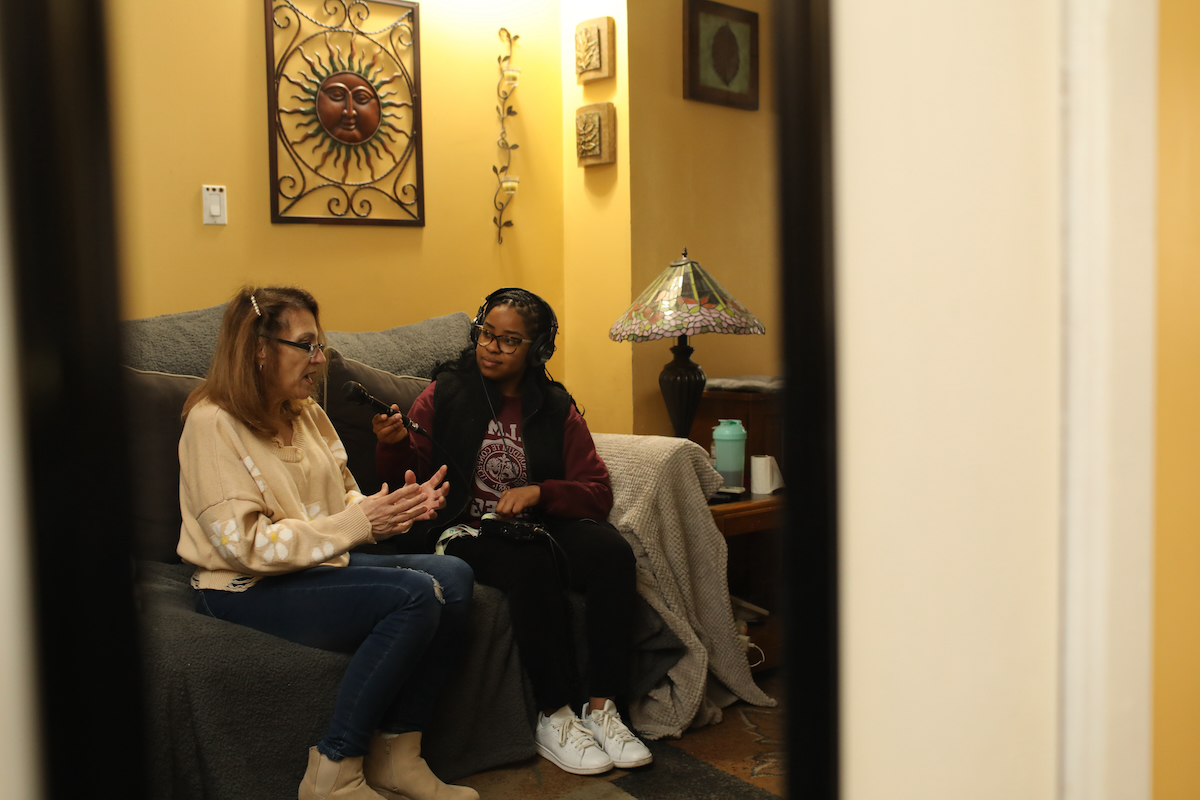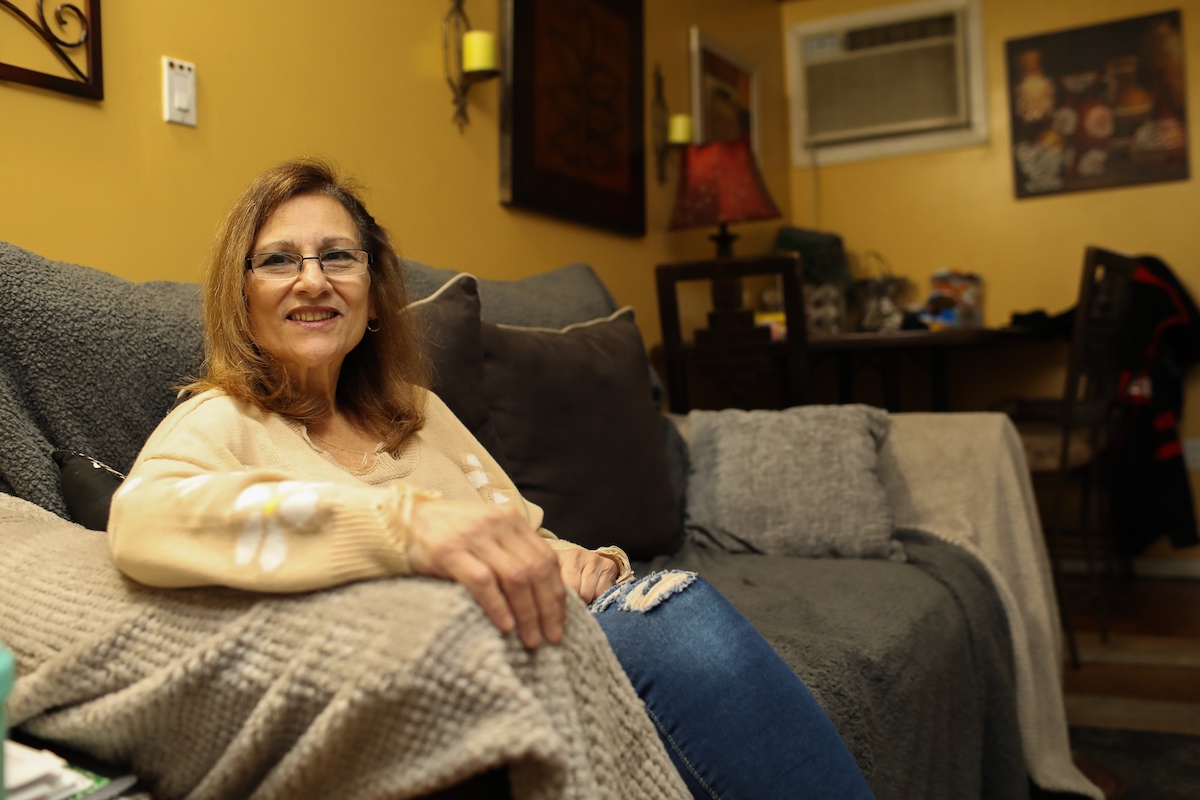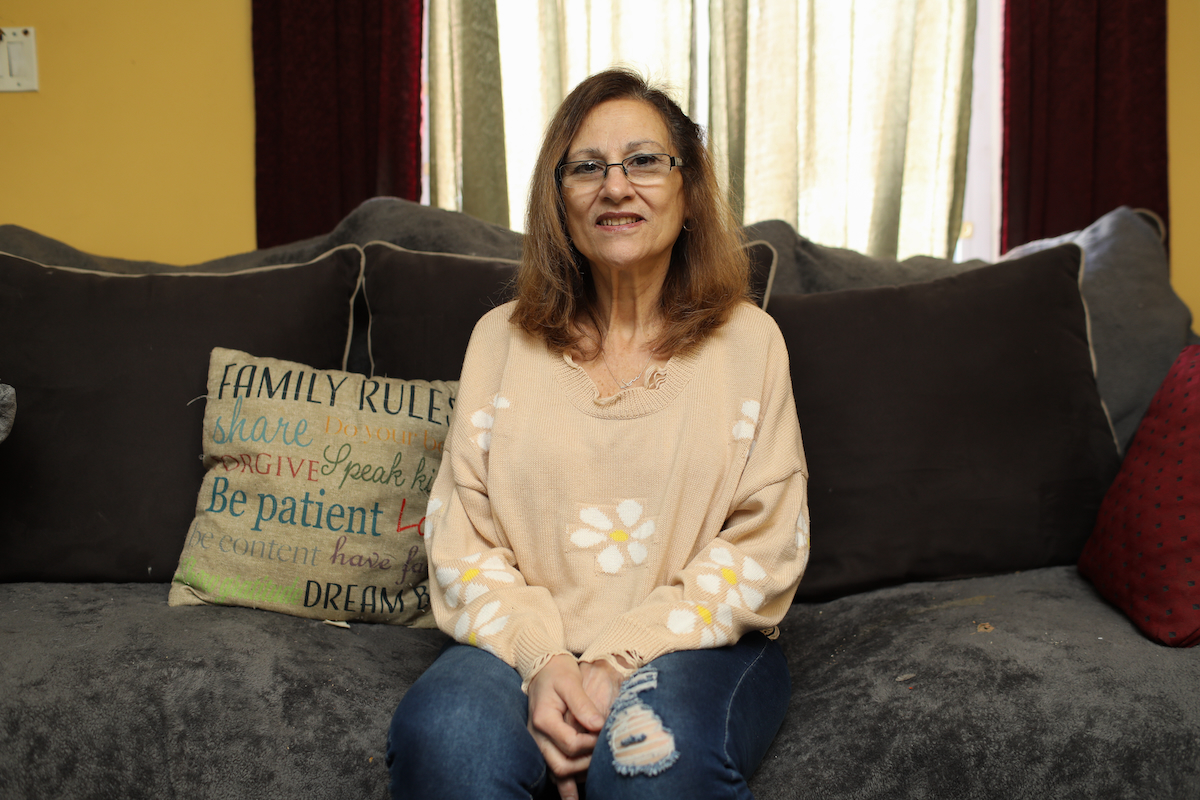Nichole Currie: Alright, now tell me who you are on tape and a little bit about yourself.
Linda Hines: My name is Linda, Linda Hines. I’m 63 years old and I’ve been married for 43 years. I have three children and three grandchildren. One great-grandchild [is] due Dec. 24.
Linda Hines is a South Philly native. It’s where she lives today. And even though she is shy and apprehensive to talk about herself, Linda loves to talk about her job.
Linda Hines: I work at a daycare center for 23 years. I love doing my job. I love working with children.
Linda is a childcare provider at a center called Shane’s Friends II. It’s a sister center to two others — Shane’s Friends 1 and Avenue Childcare.
Linda Hines: I worked at Shane’s Friends 1. I had been working there for years. I just started at Shane’s Friends 2 a few months ago. Doing the same job and everything. I love seeing new children, getting to know them, you know.
Nichole Currie: And what’s your favorite thing about working at the daycare center?
Linda Hines: Making the kids happy. Seeing smiles on their face, like when they first come through the door and they trust you. They come right up to you and they hug you. And when time for them to go home, they cry, they don’t want to go home.
Linda has been working in this field for many years — long enough to see the kids she looked after all grown up.
Linda Hines: I got kids like, you know, 30 years old come by the daycare and see me and I would say, Oh, I remember I used to change the diaper, you know, stuff like that.
Linda’s love for children began back when she was a teenager.
Linda Hines: I always babysat when I was a kid, you know, so I love being with children.
And even in her early twenties, after marrying and having a few kids of her own.
Linda Hines: When my kids were like younger, I would take the whole neighborhood to the movies like the skating ring because the parents wasn’t going to wait a couple of hours, you know, to take them all to the movies. I always had children with me. So to me, it’s not a job to me.
“I want to [keep] working with children and try to get them better education by me having a better education.”
Linda Hines
At 63, Linda hasn’t thought about retiring — she says she doesn’t know what she’d do with herself. But staying in the workforce at her age means she has to keep up with education, technology, and any advancements in her field. Linda wants to keep working, but keeping up isn’t easy.
During the pandemic, Linda’s daycare center encouraged employees to pursue a Child Development Associate — a credential for early educators who work with children from birth to five. It’s usually for people already working in the field who want to advance their education.
Linda Hines: A lot of daycare centers wants it, you know. The CDA classes. A lot of daycare center wants everybody to have that now.
When staff members at a center have the credentials, opportunities open up. More parents trust them, and a center with CDA employees is more likely to receive funding from state programs like HeadStart. For the employees at Shanes, having the certification will raise their hourly wage. However, Linda is mainly concerned with how it will make her a better educator.
Linda Hines: So I want to like, you know, still stay with work and working with children and try to get them better education by me having a better education for the daycare, you know?
In order to get her CDA, Linda has to complete certain requirements: a 120-hour CDA course, a workbook of assignments, and oral and written exams.
But it’s been over 40 years since Linda was in school — and even back then, she remembers having trouble with reading and writing, and she has test anxiety.
Linda Hines: I’m nervous about taking the test because sometimes I’m not good like that. I could talk and tell you about things, but I can’t write it down. I get nervous.
###
I’m Nichole Currie, and this is Thriving — an audio documentary about our economic future together.
I’ve been following 10 Philadelphians for a year to learn what it takes to make it in America. After a pandemic and so much social upheaval: What are the obstacles and opportunities we all face to economically thrive in the United States? Each person we’re following tells us something different about our collective future.
In this episode: older working residents.
A huge part of our working population is older, about 55 and up — the Boomer generation is one of the biggest in American history. Since there are relatively so many of them, what this generation does economically matters for everybody else. Some are staying in the workforce longer — both by choice and out of financial necessity.
To do so, they have to adapt to changing workplaces, new technologies, and updated professional training and expectations. That’s the case for Linda Hines. She loves working in daycare, but she needs help getting used to the classroom again to pursue a degree that will improve her pay and teaching skills.

About all Linda Hines did during the pandemic was think about her job — and the kids she normally spends time with there.
Linda Hines: I missed working. I missed being with them and I was wondering how they were doing.
The pandemic did a number on everyone. Fear of the virus, the isolation of social distancing from loved ones … for Linda, it was not seeing her students.
Linda Hines: You know, you were hearing people dying and I was like, you know, scared, you know, for my family, my children’s family, you know, my family. It was very scary. I couldn’t go out. I was getting depressed.
But soon, Linda was able to fill her pandemic time with a goal — improving her skills to help her future students.
Linda Hines: We did the CDA. We did the classes online.
During the pandemic, Linda’s supervisor, Nicole Regalbuto, who is also Linda’s cousin, announced an opportunity for her employees to pursue a CDA —to jumpstart post-secondary education. A Child Development Associate is a certificate offered by several schools to teach students knowledge, skills, and abilities associated with guiding children’s social, emotional, physical, language, and cognitive development. Linda and all of her coworkers signed up. Classes began in April of 2020. The employees were required to meet online on Tuesdays and Thursdays from 6 to 9 PM. And there was a perk.
Linda Hines: The CDA thing we’re doing was like, it was like online. It was like free or whatever.
A family friend of the center’s supervisor, Nicole, wrote a grant to help pay for the courses for all of the employees at Shane’s.
Dionne Wright-Chambers: My name is Dionne Wright-Chambers. I am an early educator.
Dionne is also an education consultant. She also lives in Philadelphia.
Dionne Wright-Chambers: And in the process of when COVID happened, I had created along with my business partner, Dr. Stephanie Blake, our own consultant business. Because we were finding that a lot of support that teachers needed in the field, they couldn’t afford it.
Dionne says she saw a need for early childhood teachers to obtain an education past high school — and she wanted to start with Linda and her coworkers at Shane’s.
Dionne Wright-Chambers: So, in early childhood education the goal is to make sure that we have, you know, educated teachers to be providing services for the children and the families that we serve, right? Which we should. The hindsight is that most of the workforce in early childhood education are either women of color or women who do not have any higher ed background, or I guess you could say they’re funds-poor. So how do you expect a demographic of individuals who have trouble themselves with education to create a pathway for higher ed when they did not receive that themselves as children, let alone as adults?
“How do you expect a demographic of individuals who have trouble themselves with education to create a pathway for higher ed when they did not receive that themselves as children, let alone as adults?”
Dionne Wright-Chambers
Dionne enrolled Linda and her coworkers into the Pathway to Success Program that her consulting group offers. It’s a CDA program that offers the 120-hour course, test prep, resources like laptops if people need them, and mental health support, such as therapy sessions.
Dionne and her cofounder taught the CDA course and received funding from the Public Health Management Corporation. Their sponsor was The Pennsylvania Key, an organization in PA that delivers training services to early childhood educators in the state.
The grant even covered extra remedial courses to help women like Linda, who haven’t been in school for over 40 years, get up to speed on writing and reading comprehension.
Dionne Wright-Chambers: Teachers were struggling. We got it from the teachers themselves that they just was having a hard time starting to write things, you know, or get out their competencies or they were very nervous about the test and stressed out.
Linda came up in the Philadelphia public school system in the ’70s and ’60s. She struggled with reading and writing but still graduated with a high school diploma.
Linda Hines: I could talk and tell you about things, but I can’t write it down. I get nervous. I was like that when I was a kid growing up in high, you know, school. I’m not good in testing, you know, like I get nervous.
So Dionne says those extra classes and additional test prep were in place to help employees like Linda connect the work they do in the classroom with the jargon of the CDA program.
Dionne Wright-Chambers: She is excellent in the classroom, and she moves around like magic. You know, but getting her to recognize that when you are saying this to the children, You are supporting language and literacy development at the same time you’re touching on social emotional skills and, and then connect that to the standards.
A CDA isn’t required to be an early childcare educator, but it helps people already working in the field improve their knowledge and potentially their pay. Right now, Linda makes about $15 an hour.
Linda Hines: So maybe in the future if I want to go higher, I will. But right now I’m concentrating on getting the CDA first.
When I meet Linda in the summer of 2022, she’s already done with the CDA course — she and her coworkers finished it at the end of 2020. Since then, they have been preparing their workbook assignments — a major requirement for the CDA credential. It should include assignments, essays, and additional training certificates. Once the workbooks are finished, a child development specialist will review the book and schedule their oral and written exam. They hope to take the test this winter.
But completing these workbooks has been a struggle for everyone. It’s all a lot to balance. Many workers hold second jobs to make ends meet, and aside from pursuing a CDA, they still have to manage their full-time jobs at Shane’s. And lastly, test anxiety. Many employees want to ensure they’ve got all of the information correct before sitting down and taking the exam. That’s a factor Linda is incredibly worried about.

Julie Zeglen: I think the need for continuing education shows up across a whole bunch of persona groups.
This is Julie Zeglen, Technical.ly’s managing editor.
Julie Zeglen: It’s not just something that is for professional development, it’s something that can keep you in the workforce longer. It can help you advance your career. So I don’t think that Linda is unique in that case of, of seeking it and needing it and able to advance her own career.
Retraining can be hard for older workers, but also necessary if they want to keep up with technological change, new practices, and new skills. And older Americans are a growing part of the workforce, with a huge economic impact. Some are choosing to work well past retirement age, while others have little choice but to keep working.
Julie Zeglen: It could be because costs of aging are quite high and rising healthcare costs are rising. For some people though, it’s also because they don’t wanna feel, they don’t wanna be made to feel like they’re stuck or that they have nothing to contribute to society. There’s a loneliness epidemic that affects older adults… Several people we interviewed mentioned wanting to feel connected to others wanting to continue learning, and at the same time, to feel secure amid rising expenses.
Linda is continuing to work because she loves her job. So, while she, and many of her peers keep working, she needs to adapt.
Julie Zeglen: Boomers are a big enough generation that we need some of them to stay in our workforce, but we want them to be able to do it on their own terms.
###
Every other weekend, building up to the anticipated exam in December 2022, Linda and her coworkers gather at the daycare center to study for the CDA exam and review their workbooks.
We’re just off South Broad Street, and Nicole Regalbuto — Linda’s cousin and supervisor — is going over the women’s workbooks.
Nicole Regalbuto: Alright, so where we gonna start at?
There are about seven women in the center, including Linda. The workbooks are really these huge three-ring binders that are filled with paperwork. Easily looks like over a hundred pages. There are certificates from trainings they went to, personal statements about why they want to be an early childhood educator, worksheets analyzing ten children’s books, and essays on whether or not they would recommend the books to parents. They’ve been working on these assignments since the class ended over 2 years ago. There are even portions that involve the children’s parents.
Nichole Currie: What is the family questionnaire?
Nicole Regalbuto: The family questionnaire is where we hand out these documents for parents to fill out, asking them, do we provide a safe environment for their children? Um, basically are they happy with the way the center’s running, how the teachers correspond with their children and with them?
Linda is right beside me.
Linda Hines: Alright let me see if I have mine… I have four, four.
Nicole Regalbuto: You need more than four. So you have to send more out.
The workbooks are incomplete. Some women are missing forms — Nicole’s printing them out.
These workbooks are like an entire class by themselves — and making sure every form is complete would probably be even harder if the employees didn’t do them together OR if Nicole wasn’t helping them along the way.
So the workers at Shane’s have more sessions to go. To review their binders and study. That’s so they can take their test in December 2022. But December comes and goes and no exams have been administered.
Linda Hines: Yes, and so far, it didn’t happen yet.
I visit Linda in the new year, late January of 2023.
“They think they’re playing with toys. They don’t realize they’re learning through play.“
Linda Hines
Linda Hines: We had to get our books together and everything, so. You know, make sure everything’s together.
Those workbooks that Linda and her coworkers had to finish were still incomplete and they haven’t met since before the holidays. Linda isn’t sure when the women will resume working on it. Which means she doesn’t know when they’ll finally take their exam. Linda isn’t too worried about it all — she has a lot to be excited about. Even without the certificate, Linda has already begun using what she’s learned in the classroom.
Linda Hines: I practice it with them. I make like, you know, flashcards up and I’ll make, um, like things I’ll do like on a paper matching things up, matching all the colors up and everything.
Remember, Linda is teaching adorable toddlers about the basics. Which is incredibly hard if you have any recollection of what life was like in pull-ups. Linda says different kids have different learning styles and that she has to be aware of that when helping them learn colors, numbers, and shapes. So it’s about being creative.
Nichole Currie: Can you give me like a specific example?
Linda Hines: Sometimes I’ll get the play doh and I’ll have like the alphabets like A and they will have to roll the play doh and make a shape like an A. You know, then, well, I have popsicle sticks with the A on there, and they gotta match up the lower case, you know, with the sticks and everything, like I make things like that.
Nichole Currie: And what is their reaction?
Linda Hines: They think they’re playing with toys. They don’t realize they’re learning through play.
Linda tells me much more about the techniques she learned through the CDA course. And then we switch gears. I want to know more about what a raise in pay means for Linda. Remember, right now, Linda makes $15 an hour.
Nichole Currie: How would that extra pay like help around the house?
Linda Hines: Oh, I would pay, you know, toward the bills, clothes and, you know, like getting things done, like buying new stuff for the house.

Years of wear and tear have contributed to stuff like a squeaky screen door and a broken cellar door. She also wants to buy new dishes. Little stuff that she’s put off for years. And Linda looks forward to having a little extra money for her family, especially since she has just welcomed a new great-grandchild.
Linda Hines: Because I got like four grandkids. They want to go to movies or skating out with their friends. So like 30 here, 40 here.
Like many grandmothers, Linda is a core figure in her family. She wants to help everyone out in any way she can.
Linda Hines: Because I didn’t have it when I was a kid growing up, so I try to give it to my you know, kids and grandkids.
Nichole Currie: When you were growing up was money an issue?
Linda Hines: Yeah, we was poor. My mother raised us on welfare. You know, it was hard.
Linda’s mom was a single mother with four children to raise. So there were some things Linda just grew up without.
Linda Hines: I couldn’t play dolls with the girls, because I didn’t have a Barbie. So I was a tomboy girl. So I played sports, because it was good playing football, baseball, and all that. I couldn’t play with the girls, because I didn’t have you know, Barbies or dolls to play with so they wouldn’t let me play.
So pitching in, helping her grandchildren pay for school or a trip to the movies, is something Linda is proud to do — and with a CDA, she’ll be able to help out more.
Linda Hines: When my grandkids call me up, they wanna go to movies, I know how it is not to go because my mom didn’t have it. So, you know, you don’t want them to feel left out when they’re with their friends or whatever, and you keep them off the streets So you put them in group, you know, to do things like to send them to the movies, ice skating, you know. So there not on the streets getting in trouble.
Before we end our visit, Linda and I made a deal to check in a few months from now since there is no telling when the CDA test will happen.
So for a few months, we don’t talk.
“I feel very good because when I’m teaching different stuff and seeing the kids, how they’re learning, you know, and I get all excited when they start asking questions … I’m proud of myself.”
Linda Hines
Over the course of 2023, I call Linda every week, to see what is happening with the daycare center and the CDA exam, but I get no answer.
By the end of the spring, I phone Linda’s cousin and supervisor, Nicole Regalbuto, to see if she knows anything. She tells me there have been a lot of setbacks. Nicole is working really hard to get all of her staff on the same page so they can take the test simultaneously. But with a combination of personal matters, trying to refresh the material for staff worried about the test, and running three daycare centers — it’s been hard to get back on track.
A few months later in December of 2023 — things seem to be moving again.
Nicole Regalbuto: Right after the new year I plan on having everybody tested.
Linda, her coworkers, and supervisor Nicole return to the daycare center for a study session. They have about a month to get their workbooks together for review. But even though they’re getting on track — one fear still lingers in the room.
Nicole assures them that the things they learned in the CDA course, now almost three years ago, are stuff she sees them applying in the classroom.
I ask Linda about it. She’s got one, maybe two months before a test is administered.
Nichole Currie: How do you feel to be at the end of this process?
Linda Hines: Good. Very good because we’ve been doing it for a long time and, you know, I just want to get it done and over with. You know, I’m nervous about it because I don’t know, like, what to expect that day, you know. But, you know, I’ll try my best.
And even through her anxiety, Linda is much more confident in herself, pleased that she stuck it out through this process, especially because it shows in the people she cares most about: the children.
Linda Hines: I feel very good because when I’m teaching different stuff and seeing the kids, how they’re learning, you know, and I get all, like, excited when they start asking questions. So I’m proud of myself.
For Thriving, I’m Nichole Currie.
Thriving is brought to you by Technical.ly and Rowhome Productions with support from the William Penn Foundation, Pew Charitable Trusts and the Knight Foundation.
Learn more about Thriving at technical.ly.
Thriving’s executive producer is Technical.ly CEO Christopher Wink.
The series is reported, produced, and hosted by me, Nichole Currie.
Our story editor is Jen Kinney. Managing producer is Alex Lewis. Mix and sound design by John Myers.
Special thanks to Technical.ly editors Julie Zeglen, Christina Kristofic, Sameer Rao, and Danya Henninger, and to JG Geller and Laris Kreslins of Box Theory for use of their South Philly studio.
This episode features music from Blue Dot Sessions and Philippe Bronchtein.
Our theme music is by Flat Mary Road.
Thanks for listening.

